Porsche Taycan Vs Tesla Model S: Luxury EV Sedan Fight
The Tesla Model S certainly isn't the only electric car on the market, but when it comes to the 2020 Porsche Taycan it's the obvious competition. That makes for an interesting showdown: on the one hand, Tesla has had years to refine and improve its flagship electric sedan, but Porsche brings no small legacy of crafting performance vehicles to the table.
A direct head-to-head test will have to wait until Porsche has production 2020 Taycan cars ready for the road. Factors like styling, too, are going to be subjective. So let's kick things off Top Trumps style, with a big numbers show-down.
Taycan vs Model S: Range
It's fair to say that Tesla is wiping the floor with its luxury EV rivals right now when it comes to how far you can drive on a full battery. Audi's e-tron SUV and Jaguar's I-PACE are among the electric alternatives trying to coax green drivers out of their Model S and Model X, but doing so with less range quoted on the dashboard. Unfortunately for the Taycan, it too arrives with a shortfall in range compared to Tesla's sedan.
Porsche doesn't have US EPA figures yet, only numbers based on European WLTP testing. Since Tesla offers the Model S in Europe, however, we can still compare the two cars.
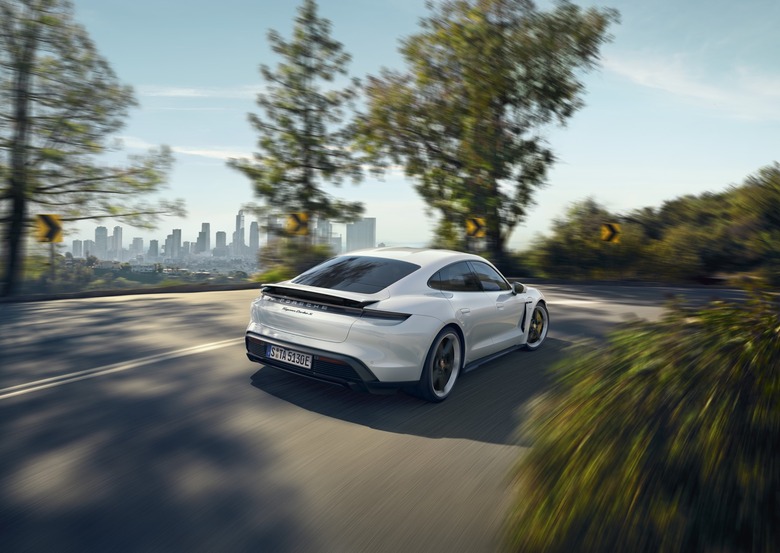
Just as Tesla has a Model S Long Range and a Model S Performance, so Porsche has two initial variants of the Taycan. The Taycan Turbo will get up to 280 miles on a charge, the automaker says, while the Taycan Turbo S tops out at 256 miles. In contrast, the Model S Long Range is quoted at 375 miles, and the Model S Performance at 365 miles.
That's a fairly large delta, though it puts the Taycan somewhere in-between what's quoted for an e-tron SUV and an I-PACE. As for what we might be able to expect in the US, by the EPA's tests the Long Range Tesla comes in at 370 miles and the Performance at 345 miles. So, it seems fair to expect a dip in what the Taycan will be quoted at.
Taycan vs Model S: Power
Both cars are all-wheel drive, but there's a big difference in horsepower depending on whether you go for the Long Range or the Performance version of the Model S. The former offers 417 hp, while the latter delivers 762 hp. Top speed for the two variants is 155 mph and 163 mph respectively.
Both Taycan variants, in contrast, have a 161 mph top speed. Porsche also quotes two different horsepower numbers: a standard power rating of 616 hp, and one under so-called Overboost conditions. Push the car hard, and the Taycan Turbo will give you up to 670 hp for 2.5 seconds, while the Taycan Turbo S nudges that up to 750 hp.
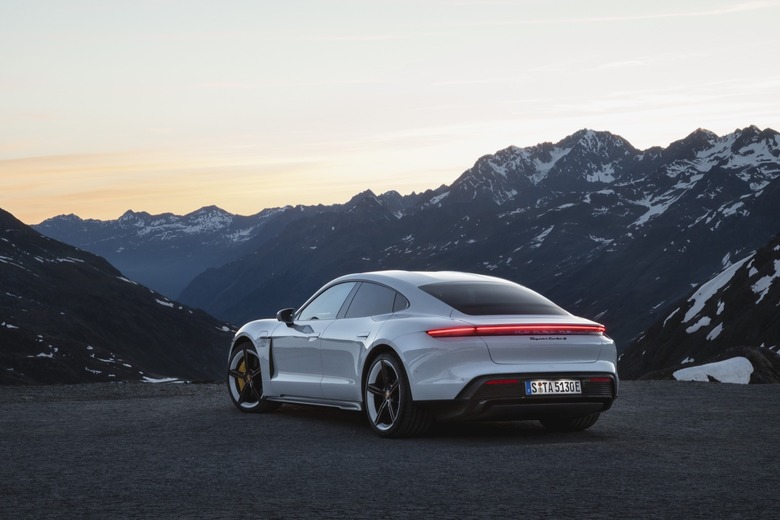
While power is all well and good, one of the greatest charms of EVs is their instantaneous – and usually plentiful – torque. Sure enough, both Tesla and Porsche are generous with what their dual electric motors can offer.
Currently, Porsche is only giving maximum torque numbers for Launch Mode. There, the Taycan Turbo is rated for 850 Nm or 626 lb-ft, while the Taycan Turbo S clocks in at 1,050 Nm or 774 lb-ft.
They're higher figures than what's quoted for the two Model S versions. There, the Long Range car packs 658 Nm or 485 lb-ft, while the Performance offers 967 Nm or 713 lb-ft.
Taycan vs Model S: Speed
Why is power important? Speed, of course. Porsche has already shown us some of the Taycan's more unusual performance abilities, but there's nothing quite like 0-60 times to get fans excited.
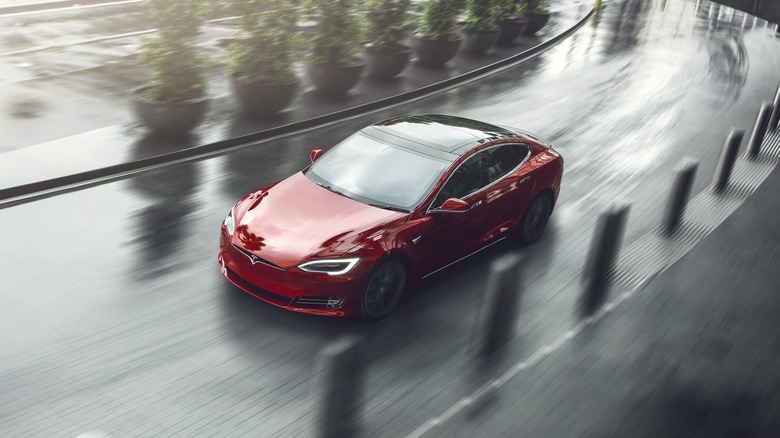
The Taycan Turbo will do 0-60 mph in 3.0 seconds, Porsche says, while the Taycan Turbo S takes 2.6 seconds. In contrast, the Model S Long Range needs 3.7 seconds, while the Model S Performance does it in 2.4 seconds.
In short, all four cars are fast – more than fast enough, indeed, to embarrass gas-powered rival sedans – but the Tesla edges slightly ahead of the Taycan Turbo S. On the flip side, the entry level Taycan is slightly faster than the entry level Model S.
Taycan vs Model S: Charging
Porsche's counterpoint to the Taycan's lower range than the Tesla is how fast its EV can charge. With 800V architecture, the new car can handle up to 270 kW DC fast charging. Later on, Porsche suggests, that could rise to as much as 500 kW. Of course you can't actually find such a powerful charger as that out in the wild right now.
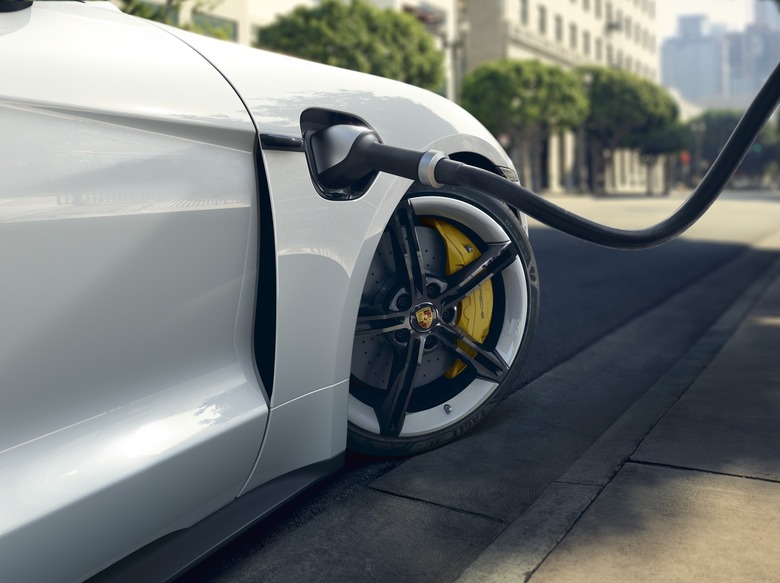
Infrastructure is something Tesla has long had to laud over its rivals: it has been building out its Supercharger network for years now. The latest generation of Supercharge V3 stations are its fastest yet, though while a Model 3 can tap into up to 250 kW there, the Model S (and Model X) top out at 200 kW. Those third-generation chargers are still fairly rare, of course; most locations have Supercharger V2, which can deliver up to 150 kW to a Model S.
For the fastest Taycan charging, you'll probably be looking for an Electrify America location. They can deliver up to 350 kW, more than enough to max out what the Porsche can accept at launch. Of course, the downside is that they're still rare too: Electrify America says it should have more than 480 stations in the US by the end of the year, but some will only deliver 150 kW at most. In an ideal world, going from 5- to 80-percent charge could take 22.5 minutes, Porsche claims.
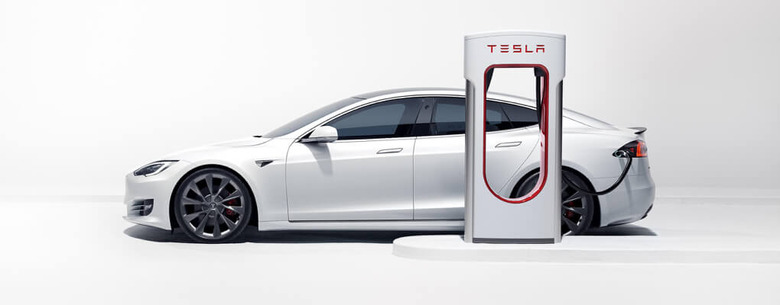
High kilowatt ratings are only part of the equation, mind. The rate at which a battery can charge depends on what level it's already at: going from 80-percent to totally full could even take as long as it does to go from 5- to 80-percent. That's battery chemistry that affects every automaker, and part of why both Porsche and Tesla – and others – are pushing for EV drivers to think of public charging stations as ideal primarily for a swift top-up to get you back on the road as soon as possible, rather than as a place where you go to fully recharge.
Taycan vs Model S: Verdict
The specter hanging over the 2020 Taycan is its price tag. While more affordable versions of the car will arrive later in the year – with more humble power figures – the initial Turbo cars are Porsche's flagships. That means they carry a Porsche premium, and it's enough to make you wince.
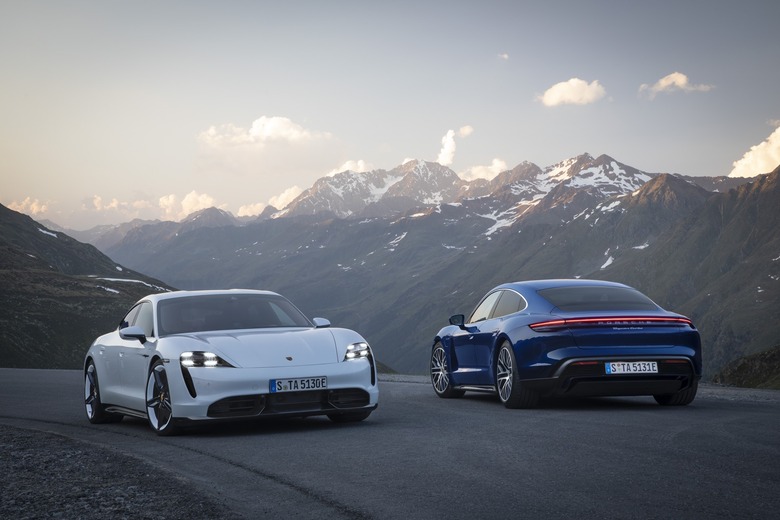
The 2020 Taycan Turbo kicks off at $150,900 plus destination; the 2020 Taycan Turbo S, meanwhile, starts at $185,000. In contrast, a Tesla Model S Long Range begins at $79,990 plus destination, while the Model S Performance starts at $99,990.
That's a sizable delta between the two automakers, and whether it's worth it for you depends on how much you value things like the Porsche badge and all the engineering that has gone into making the German EVs spritely on the road. It's hard not to see the Tesla duo as the bargains of the bunch. Now, Porsche needs to prove that everything it has done to justify its Taycan's premium price tag was worth it in the long run.
